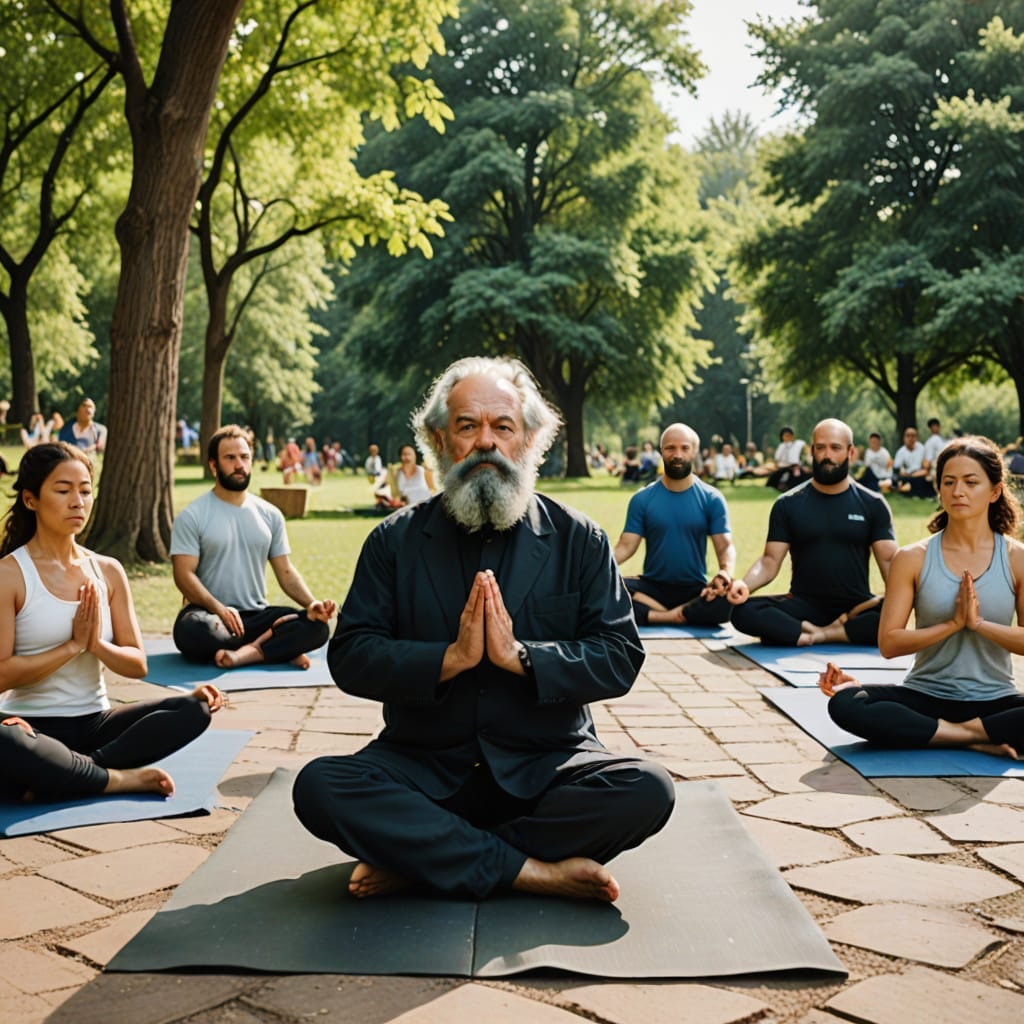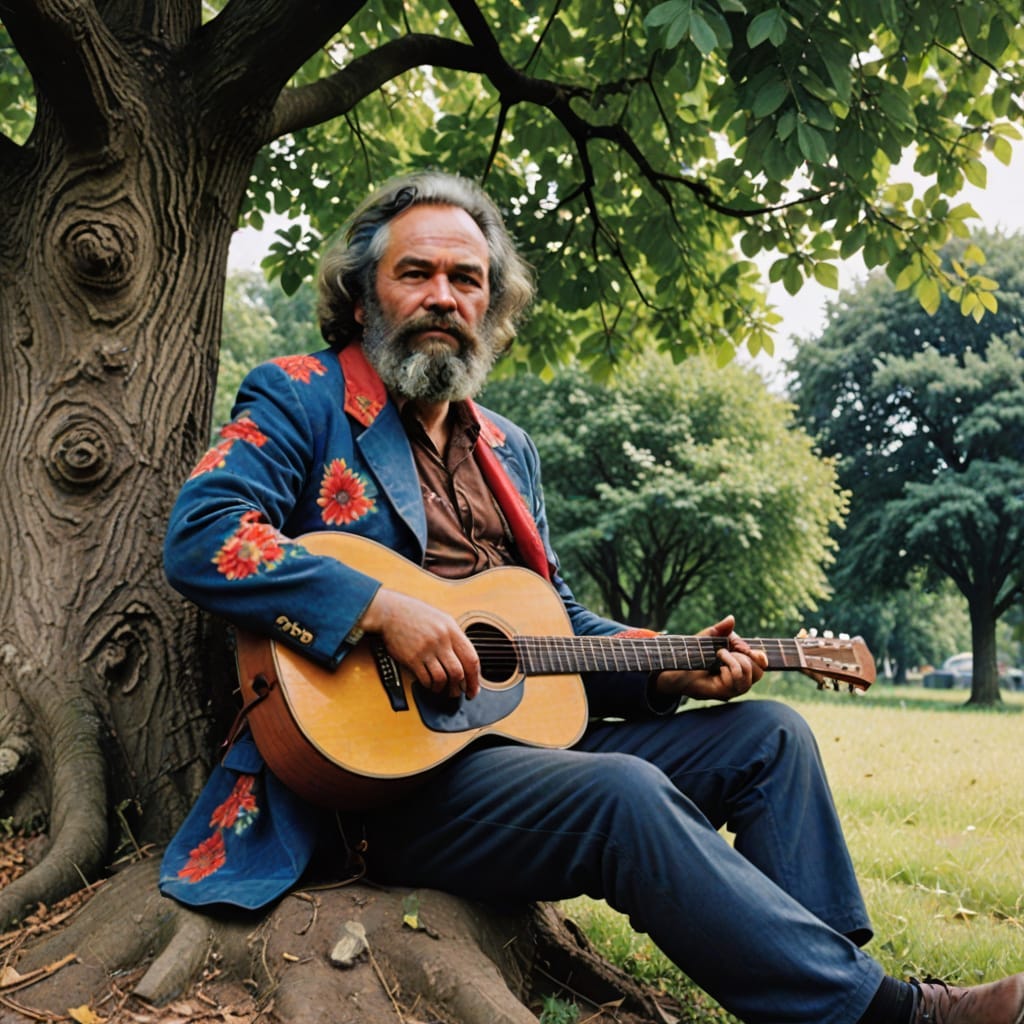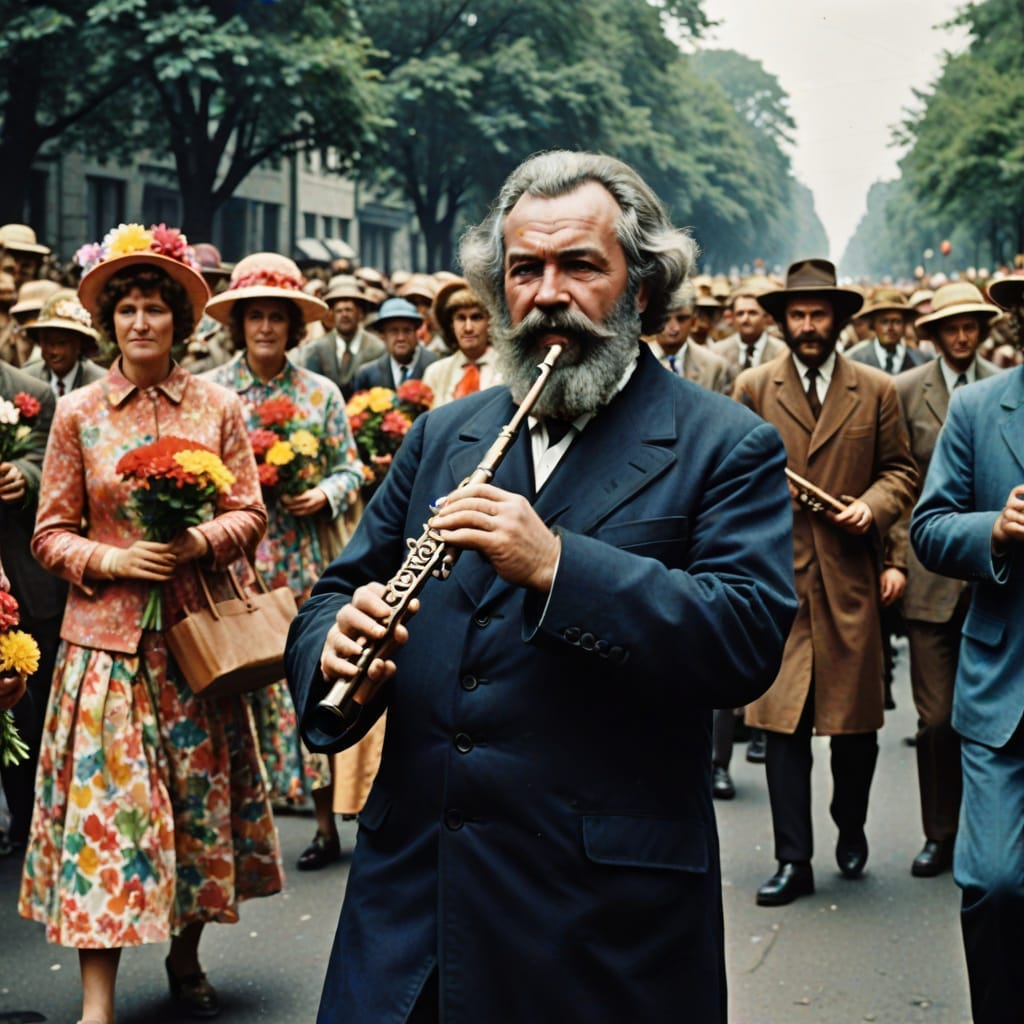Note:
This is the fourth post distilling the college lectures on Karl Marx for my Introduction to Sociology class. They do not need to be read in order, but it helps. If you are interested, here are the other three posts.
Imagine no possessions
I wonder if you can
No need for greed or hunger
A brotherhood of man
Imagine all the people
Sharing all the world--John Lennon, Imagine
It's Human Nature, Man!
Let's summarize where we are in our description of Marxist analysis. Through most of human natural history, people lived in communal tribes in which they worked collectively to seek, gather, and share the resources necessary for survival. About five to ten thousand years ago, human beings learned how to domesticate animals and plants in such a way as to produce a surplus. This technology should have liberated humanity from a life of subsistence.
Instead, a small number of people claimed the power to be in charge of this surplus. They made and enforced the claim that they owned the surplus. In doing so, they created the concept of Private Property. They said, "this surplus of grain is mine because...well, you can fill in the blank: (God gave it to me) (I took it with my army) (the land is mine) (I inherited it) ...it all amounts to, "I'm a bigger bad ass than you, so it's mine! If you want some of it, you have to do what I want you to do to get it.
The Dialectic was born. Remember, the Dialectic is the conflict inherent in the relations between those who own the means of production and those who must exchange their labor for the resources necessary to survive. Because this dialectic is based on the material conditions of life, who has access to the resources, Marx claims that the base of all societies is economic.
To justify this blatantly unfair social arrangement, a Superstructure is built on the foundation of the economic base. This Superstructure is materially supported by the economic elite, and in return, all of the elements of the Superstructure, families, schools, churches, the state, etc., produce the ideologies that sustain the economic relations. In other words, how we understand the world, our ideologies, or "ideas", is shaped by the economic realities that sustain the Mode of Production in which we live.1
This is great if you happen to be among the group that owns the means of production. It is not so great if you are among the majority of people who must sell your bodies and your time if you are to survive.
At this point in any conversation on Marx I usually get the response, "Yeah, but this is just human nature. Human beings are naturally greedy and acquisitive. Some people are just better than others at getting what they want."
Really? Let's use Marxist analysis to explore this concept.
You are a Species Being!
Since I teach a sociology class, one of the underlying themes of my curriculum is to be skeptical of what I call The Nature Hypothesis. This is a reference to the Nature vs. Nurture debate between social and cultural influences on human behavior and so-called "natural" influences including genetics, biology, and psychology. As a sociologist, I tend to reject The Nature Hypothesis. I'm willing to accept that human beings are, by nature, social. Beyond that, I'm skeptical.2
Marx, however, was not a sociologist. He actually had a theory of intrinsic human nature.3 Human beings, according to Karl Marx, are Species Beings. "Man is a species-being, not only because in practice and in theory he adopts the species (his own as well as those of other things) as his object, but – and this is only another way of expressing it – also because he treats himself as the actual, living species; because he treats himself as a universal and therefore a free being." (1844/1964) In other words, human beings understand themselves in terms of their species, they see humanity as an object in and of itself, but also see themselves as an independent, free, part of the whole. So being human has an objective reality, but also a subjective experience.4
Whereas other animals act in accordance with the needs of their own, individual survival, and only consequently guarantee the survival of the species, human beings5 are different. A human being sees itself as a part of humanity and is, therefore, driven not just by personal survival, but to the work of humanity in the natural world.
Whereas animals who have gained enough resources for their individual survival will stop and rest, human beings are different. When a human being's survival is assured, it continues to labor to shape nature according to his conscious will rather than just his need for survival. He shapes the world according to his vision. "Man therefore also forms objects in accordance with the laws of beauty." (1844/1964)
For Marx, human beings are, by nature, productive and creative. We want to work, and we want that work to be meaningful. It is not enough for us to just fill up the silos with grain for the winter and then be done. We want to build beautiful silos, and picturesque landscapes. We want to paint and carve and write poetry. We sing, dance, tell Dad Jokes.
We do this not because we are getting paid. We do this because we derive satisfaction from being productive and creative. Think about it. If you had a choice between going to work and staying home and doing your hobby, which would you choose? The economic prediction would be that you go to work because at work you receive a tangible, material reward of pay. Whereas your hobby actually costs you money.
Human beings are not an economic species, as some have labelled us Homo Economicus.6 Contrary to what we are lead to believe, pay is not the reward we get for working. Pay is the inducement to get us to do work that we otherwise would not do. Our hobbies, however, bring us internal satisfaction. We derive personal fulfilment and meaning from doing them. We don't need to be paid to expend a great deal of time and energy on our hobbies. Indeed, our hobbies often cost us money. "The object of labor is, therefore, the objectification of man’s species-life: for he duplicates himself not only, as in consciousness, intellectually, but also actively, in reality, and therefore he sees himself in a world that he has created." (1844/1964)
Come on, Man! You can't be serious. It's common sense. Some people are just lazy and others are industrious. Just look around you.
Well, wait. Previously you said that human beings were greedy and acquisitive, but some were just better at being greedy than others. Now you are saying that some people are naturally greedy, and others are naturally lazy. Which one is it? How can you ascribe a quality to human nature that not every human possesses? Unless you are making the claim that some human beings are just better...maybe even a slightly different species than other humans.
This is what Marx referred to as an Ideology. For Marx, Ideologies were not ideas that we use to understand the real world around us. Ideologies are rather propaganda that is used by the economic elite to justify their elite status and the resulting exploitation of everyone else.
Think about what our common sense notion of "human nature" reveals. People are naturally greedy. Well, this is a great way to justify a system like Capitalism that thrives on and rewards behavior that any other culture would decry as selfish.
Some people are just better than others at being acquisitive. Some people are better? And these are the people with the most stuff? How convenient is that? My wealth accumulation is not the result of systems of exploitation that I have the status to manipulate for my own interest. I'm wealthier than you because I'm better than you.
And you are not wealthy not because you happen to be in a position in which those in power can exploit you. You are simply not as smart and capable as those who are wealthy. Obviously, you are not lazy. Lazy is a judgement reserved for "those people!" But still, you don't deserve to live in the lap of luxury because you are simply lacking in whatever it is that Elon Musk has. Sucks for you!
Your Consciousness is False!
You see how our assumptions about human nature conveniently justify our economic relations--our Capitalist Mode of Production. According to Marx, this is the job of the Superstructure. All of the non-economic institutions in our society, including our own families, exist to lie to us. They convince us that we are not a universal species-being naturally inclined to creative work. Rather, we are different classes of people, some of whom are better than others, some of whom deserve to be exploited.
Here's that materialist dialectic again. For Marx, the history of human modes of production all comes down to the dialectic. In ancient times, the general with the better army had a claim to superiority over those he conquered. He was, therefore, justified in enslaving them. Slaves, having been conquered, were taught that their enslavement justified because their gods were not as good as the gods of the conquering army, or their gods abandoned them, or...again, fill in the blank.
Regardless, their slavery was just the way of the world, and they just happened to be on the wrong side of that reality. It was lie. Slavery was just as much a human construct, as were the armies used to conquer. Neither construct was a universal feature of human history. In fact, through most of human natural history human beings had neither armies nor slaves...nor private property, another artificial human construct.
Marx hypothesized that the Mode of Production in which we live actually distorts our consciousness as a species-being. This creates a false sense of self as it relates to the Mode of Production. In other words, it is a False Consciousness. We are aware of ourselves not as productive and creative, but as owners or workers in relation to the Mode of Production.
We don't see ourselves as independent members of a beautiful species that creates masterpieces and epics. Instead, we see ourselves as workers, competing with other workers. Instead of a universal humanity existing in a colorful tapestry of different cultures, we see ourselves as members of a race, or ethnicity, or gender, that may or may not be superior to others. We are taught to see our fellow human beings as threats to our well-being rather than integral to collective human progress.
In other words, the Superstructure lies to us, and when we embrace the lies as truth, we become incapable of applying our creative selves to human progress. Instead, we try to monetize our creativity, sell it, use it to expand our wealth, and thus our ability to be the exploiters rather than the exploited. "The consciousness which man has of his species is thus transformed by estrangement in such a way that species[-life] becomes for him a means."
I write a beautiful song not because it's a beautiful song, and end in itself, but because I can make money if it goes viral on YouTube. Writing songs is a means of advancing myself within the Mode of Production. Consequently, when writing a song, my consciousness is distorted, my creativity warped. Instead of a song I find beautiful, I look at all the other songs that make money...and I do that. I follow the formula for economic success. Consequently, music lovers pay the price. Instead of a diverse catalogue of songs, each of which offers a unique perspective, our playlist is filled with variations of the same rhythms, melodies, and lyrics. The stuff that sells. This is called "commodification" or the reshaping of human labor into a commodity that can be bought and sold.7
Have you ever been listening to the radio and you have to change the channel, or move to a different playlist because all the songs are starting to sound the same? That's the result of commodification.
Humanity cannot advance under this materialist impulse, but the handful of capitalists who own the record companies gather more and more wealth. If you come up with something unique, it will not be picked up by a producer because she cannot take a risk of developing a song or an album that might not sell. Go back and follow the formula we know will sell advertising. That's what our Mode of Production says is the right and natural way of creative production.
It's a lie. And Marx's entire oeuvre is dedicated to convincing us that this consciousness we've been imbued with is a lie, and this lie causes untold suffering and damage.
You've Been Alienated!
According to Marx, all human beings within the Capitalist Mode of Production have had the consciousness of their Species-Being distorted.8 Instead of a Species-Being free to shape the world through creative expression, true to our human nature, people are workers, or owners. Our consciousness is focused on these relations to production without regard to our humanity.
According to Marx, human beings are alienated from their true natures by participation in the Capitalist Mode of Production. Alienation describes the state of disconnection people experience from what would otherwise be fulfilling and meaningful relations in their lives. Marx focuses on the alienation of workers, the Proletariat, but an equally sound argument could be made for the owners as well. The very existence of a dialectic infers that different classes of human beings are being alienated from each other.
To understand alienation, let's take another look at our chair maker from previous posts. Our furniture maker in the Feudal Mode of Production was a skilled craftsman. He went through an apprenticeship process where he learned furniture production as a craft. He may not have aspired to this, but at some point, he became a journeyman, and then upon creating a Masterpiece, he was recognized as a Master Craftsman.
When he made a chair, he went out and acquired the materials. He then put his labor into creating a beautiful and sturdy chair. They were his materials, his time, and his skill in making the chair. When he sold that chair, the value that he added to the wood and fabric was reflected in the price of the chair. It all went into his pocket. It was his materials, his workmanship, and upon making an exchange, the profit belonged to him. This was not only a lucrative endeavor, but a creative and meaningful one.
Contrast this to a worker in a modern furniture factory. Her job may be to attach one of the legs to a long line of seats. The leg itself had already gone through a manufacturing process involving machinery rather than handicraft. She has a big bucket of chair legs, and as the seats are carried down a conveyor belt, she attaches that one leg and moves on to the next seat. No skill is involved. No thinking is involved. Her actions are no more meaningful than that of a mechanism in a great machine. She is nothing more than one of hundreds of cogs in that machine.
This is what Marx refers to as Estranged Labor. "Estranged labor turns thus... Man’s species-being, both nature and his spiritual species-property, into a being alien to him, into a means of his individual existence. It estranges from man his own body, as well as external nature and his spiritual aspect, his human aspect." (1844/1964)
The woman above has been "estranged" or "alienated" in many ways. First, she is alienated from the very fruits of her production labor. She does not own the chairs she is building. They, like the factory itself, are owned by a capitalist...a capitalist who may have never built a chair in his life. Even her very labor is not her own. When she took the job in the factory, she agreed to exchange her body and her time for a wage. During that time in the factory, her labor literally and contractually belongs to the capitalist. Indeed, she likely doesn't even make enough money to be able to afford to buy one of the very chairs she is assembling.
She has also been alienated from the labor itself. The factory worker is not producing creative work. She is simply screwing a leg into a seat repeatedly. The work is monotonous, unengaging, unfulfilling. The only reason she is even doing this work is because her labor is, to the owners of the factory, cheaper and more efficient than a machine that could do the same work. The minute that is no longer true, she will be replaced by a machine. In the meantime, if she decides she has had enough and quits the assembly line, no problem. Someone else will be trained to replace her in short order. She's expendable, and she knows it.
Consequently, she is alienated from others. She sees other people as competition. Being expendable, she knows that anybody could do her job. Her relation to other workers in this Mode of Production is not communal. It is exploitative. To survive, she must be docile and obedient in the face of exploitation. She must work as hard and as efficiently as possible regardless of her personal motivation. Further, she must be willing to accept a lower wage than she otherwise would because if she doesn't, the next person in line will be happy to do so. Instead of feeling a sense of human community and solidarity with her fellow workers, she has learned to see them as a threat to her job and her security.
She is also alienated from herself as a species being. Time and energy that she puts into doing monotonous, mechanical labor, is time that she does not have to express herself as a creative human being. At the end of the day, she does not have enough energy to write the great American novel. Overwhelmed with fatigue she can only sit in front of the television and rest until going to bed, only to start the dehumanizing production process again. Her aspirations can never be fulfilled.9
Again, this alienation is woven into the entire fabric of the Capitalist Mode of Production. Even the wealthy capitalist is alienated. He's alienated from the product that he produces. He has nothing to do with the furniture being boxed and shipped from his own factory. He had no hand in building anything. The chairs coming from his factory are produced for profit, with little attention to their beauty and aesthetic. Indeed, the very quality of the product is related not to the owner's personal desire to create, but rather to the price he can get on the market and the increased profits demanded by his shareholders.
His workers resent him because they depend on him for their meager wages. They know they are being exploited. He is not a partner in the production process. He is a boss who can hire and fire at whim. Furthermore, he hates and resents his workers because he knows that he depends on them for his profits. He couldn't build a chair to save his life, let alone assemble thousands of them for sale. He sees his workers as a threat should they unionize, should they act collectively in their own interests, should they exercise their species-being by acting in solidarity. He fears their very humanity. If he is forced to give them more, then he will have to make do with less. But all he knows is profit. He must profit if he is to survive, and he must increase his profits, or investors will turn elsewhere for their investments.
He is also alienated from his own species-being because he does not see nature as an object for his creative efforts. Nature is simply a source of material resources to be exploited for profit. A beautiful forest has no value but for the wood he can extract for his furniture. If clearcutting the forest increases his profit potential, then that's what he will do.
You're a Species-Being...Just Like Everyone Else
It is clear from this analysis that the Mode of Production above is not conducive to a healthy species being. In many ways, we know this instinctively. We know that something is wrong when the thought of going to work makes us depressed or anxious. A healthy human being revels in getting out of bed in the morning, rubbing their hands together at the prospects for what can be created during the day. Human beings are communal, deriving joy in interaction among fellow humans, all dedicated to human progress and adding something of beauty to the world. We are not intended to labor for the "legal tender."10
I'm gonna be a happy idiot
And struggle for the legal tender
Where the ads take aim and lay their claim
To the heart and the soul of the spender
And believe in whatever may lie
In those things that money can buy
Where true love could have been a contenderJackson Brown, The Pretender
Furthermore, a lot of what Marx is talking about in his Economic and Philosophical Manuscripts resonates with us. We know it's true instinctively. When do we feel our best? We are the most fulfilled when we are participating in our hobbies, when we are hanging out with friends and family and colleagues with nothing more to focus on than laughter. Think about how you feel when you find yourself surrounded by beauty. Perhaps it is the beauty of the natural world, the Redwood Forest, the Grand Canyon. Maybe you are looking up at the ceiling in the Sistine Chapel, or in an art museum. Is that how you feel when you walk into work to make that paycheck?
How many times have you heard stories of people holding lucrative, high-status positions only to quit? Then take huge pay cuts to go into teaching, or baking, or something. When you ask them why they explain that if they stayed in their previous positions they would die or lose their minds. They wanted to do something meaningful with their lives.
Okay! Whatever! Look, we are not all poetry-loving hippies running around naked, playing the flute and chasing butterflies. Some of us are just not creative.
Marx and I are going to call shenanigans on this one.
Look, as a teacher, I got this comment a lot because I always incorporated "creativity" in my grades.11 My students would get upset. "I'm just not creative! It's not fair to grade me on creativity when I'm not a creative person!" Waaaaa!
Bullpucky! And yes, I used that very term! Every one of my students was and is creative. They had just spent time in schools and schools are ground-zero for snuffing out a child's species-being.
To prove this just take any small child and give them a random object...a cardboard box, or a laundry clip, and see what happens. I guarantee that cardboard box will become a spaceship, or a castle or any of a myriad different things. Find that same kid in third grade and give him a cardboard box. He'll look at you like you have three arms. What happened?
According to Marx, the school is part of the Superstructure that sustains the Capitalist Mode of Production. School is where we prepare children to be "productive workers" in preparation for their place within the relations of production. And nobody really wants that. Students are taught a work ethic, to do meaningless assignments, and to get them done on time. They are taught that learning is work, and that this work is transactional. Learning isn't something that you do naturally for the sake of becoming a well-rounded individual or to maximize your human potential. Learning is done to get a grade or to pass the standardized test. These things have no intrinsic meaning, but so students are taught that those with the highest grades or the best test scores are the better people. If you want to be a better person, you must get those meaningless grades up.
And creativity doesn't matter so long as you get the meaningless, tedious, bookwork done.
The students who go their own direction and study the stuff they like rather than the stuff the teacher is imposing on them...well, those are behavior problems that must be addressed. Either coercive measures must be taken to get them to conform, or drugs can be applied after the appropriate diagnosis.
Then a teacher comes along who grades creativity and all hell breaks loose.
Yeah, but we can't all be naked hippies! Some of the work that needs to be done is crappy, and someone's got to do it.
Well, maybe. Through most of human history everyone did pretty much the same work. Whatever the tribe needed people worked collectively to accomplish. Early human groups were based on mutual aid rather than competition and exploitation.12 Civilizations, however, were born on exploitation. For thousands of years, this is all we have known unless we belonged to less cosmopolitan and urbane indigenous cultures.
These civilizations created lots of shitty jobs that are necessary not for the survival of the species, but rather the survival of the civilization. The species existed for thousands of years without needing to do these jobs. But our species did not exist without fabrics, fossil fuels, or computer chips. To have these material things, lots of crappy stuff is the side product.
An argument can be made that human social evolution from tribal cultures to nation-states, to global supply-chains, is dependent upon these shitty jobs, and someone has got to do these jobs.
Okay. Maybe you're right. But why is it that people have to be exploited to get this work done?
What do you mean?
Well, isn't it interesting that the shittiest, most unpleasant jobs also tend to be the lowest paid?
Um...
Shouldn't the shittiest jobs be the ones with the most remuneration? Shouldn't the people who are willing to do these jobs be rewarded the most, while those who do jobs that align with their interests should see that as their own reward?
Indeed, in a Mode of Production that was not exploitative of other Species-Beings that is exactly what you would see. Instead, in a Capitalist Mode of Production, where profits are the primary focus, paying people what they are worth based on the labor they perform is not profitable. Therefore, some must be exploited in order for others to prosper.
That we don't recognize this has nothing to do with human nature. After all, Marx was a human, and he had a different approach. And he wasn't alone. Marx laid the theoretical foundation for analyzing the Capitalist Mode of Production from the point of view of its victims, but he wasn't the only one to imagine a world without exploitation.
Imagine No Dialectic!
In the first post on this project, I made the claim that Karl Marx was an idealist. This was a contentious claim since Marx famously rejected the idealistic thought advanced by Hegel and his school of philosophy in favor of a materialist analysis. It's true, philosophically Marx's body of work focuses on the material realities of the world as it exists. In fact, Marx was famous in his critique of utopian socialists for being too bound by idealism and detached from material reality.
Marx would not have approved of my characterization of him as an idealist. Yet, inferred in his body of work, especially in The Communist Manifesto, and Critique of the Gotha Program is a notion that a better world is possible.13 Marx is an idealist in that he had a concept of an "Ideal Type" of society. For Marx, the key corruption of human society is the creation of private property.
The minute someone came along and was able to enforce a claim that "this grain is mine," civilization was pushed in the direction of the dialectic. For Marx, all further development in the history of man was the result of the conflicts associated with the dialectic between those who own the factors of production and those whose labor is exploited as a result.
According to Marx, every dialectic holds the seeds of its own destruction. Ultimately, Marx held that, like the dialectics inherent in all modes of production, dialectical divisions in general would ultimately come to end. At some point, people would come together to collectively manage the means of production. This would end private property and usher in a classless society, with no authoritative state, governed through direct democracy. This society would be one in which all contributed according to their ability and benefit according to their needs without anyone being exploited, no need for crime, or violence.
You might say he was a dreamer, but he was not the only one...
The problem, according to Marx, was those who believed that they benefited from the Mode of Production as it is not just going to give up their power without a fight. Ending the dialectic...and in doing so ending history as has been written for thousands of years...would require a colossal revolution. Those who have heard of Marx without actually reading his work are most familiar with his revolutionary ideas. Indeed, the predicted Revolution of the Proletariat is arguably his most notorious idea. It is also the weakest link in his theoretical framework.
Next: So, you say you want a REVOLUTION!

Marx, Karl, and Friedrich Engels. [1846] 1970. The German Ideology. Edited by C. J. Arthur. New York: International Publishers.
I'm not a purist on this like many of my sociological peers. However, I believe it is a good policy to begin with a nurture explanation and try to rule it out before settling on a nature explanation. The science, I believe, supports this approach. Even as we break down the genetic biome, the line between the influence of lived experience and our genetic influences has become even more blurry. Human behavior is increasingly revealing itself to be a complex matrix of society and biology, of which the sociologist is interested in the society influence. See Ridley, Matt. 2003. Nature via Nurture: Genes, Experience, and What Makes Us Human. New York: HarperCollins. as just one example.
Marx, Karl. [1844] 1964. Economic and Philosophic Manuscripts of 1844. Translated by Martin Milligan. New York: International Publishers.
There is a lot of sociology drawing from this interaction between the subjective and objective self. We usually associate this with the work of George Herbert Mead, but we can see the seeds of this idea in Marx.
Marx, of course, uses the word "man" as a synonym of human being. I don't live in the 19th century, so I will not hold to this tradition.
Mill, John Stuart. [1848] 1909. Principles of Political Economy: With Some of Their Applications to Social Philosophy. London: Longmans, Green, and Co.
Marx, Karl. [1867] 1976. Capital: A Critique of Political Economy, Volume I. Translated by Ben Fowkes. New York: Penguin Books.
I believe this is an underappreciated element of Marxist analysis. Marx, himself, focuses on the consequences of this false consciousness on "the Proletariat." But if his analysis is correct, and our relationship with the relations of production within a particular mode creates a false consciousness, then it stands to reason that those at the top of the dialectic are just as much imbued with this false consciousness as those being exploited.
At least not without tremendous force of will and personal energy
Jackson Brown, The Pretender
I called it the Three C's. Complete, Cerebral (in other words, a lot of thought was put into the project), and Creative (in other words, something was added to the project that went beyond what I was looking for)
Kropotkin, Peter. [1902] 2006. Mutual Aid: A Factor of Evolution. Mineola, NY: Dover Publications.
For The Communist Manifesto: Marx, Karl, and Friedrich Engels. [1848] 2011. The Communist Manifesto. New York: Penguin Classics. and For Critique of the Gotha Program: Marx, Karl. [1875] 1970. Critique of the Gotha Program. Edited by C. P. Dutt. New York: International Publishers.












